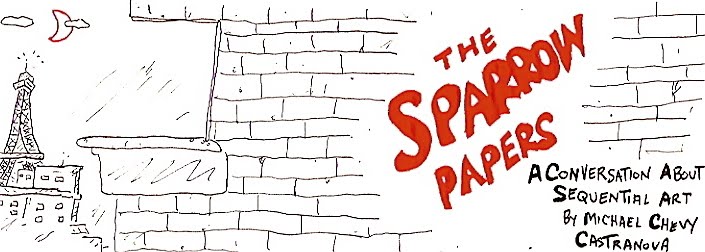 In September Fantagraphics Books will publish Jacques Tardi and Jean-Claude Forest’s Ici Même in English for the first time, under the title You Are There.
In September Fantagraphics Books will publish Jacques Tardi and Jean-Claude Forest’s Ici Même in English for the first time, under the title You Are There. For the past 34 years, Tardi’s illustrations have brought to vivid life several existing written works, some for the wonderful but now defunct a suivre magazine or for Casterman publishing in France. (And a number of them are available in English, to be found at second-hand shops or through American Book Exchange.) Among my favorite series to which Tardi has turned his hand:
• Leo Malet’s detective Nestor Burma, who prowls the arrondissements of occupied and, later, post-WW II Paris, smoking his pipe and often getting caught up in much more than he bargained for. When he’s not stopping off for a drink or three somewhere, that is.
• The artist’s own Adele Blanc-Sec, journalist and generally cranky amateur sleuth, whose sometimes-hallucinatory adventures have involved demons in the Eiffel Tower, rampaging mummies, and multi-tentacled monsters rising out of the Seine to snatch infants from their strollers. Occasionally our heroine even gets around to writing about her escapades to pay the rent. (Did I mention her crankiness? “Blanc-sec” means “dry white.” Get it?)
• But Tardi’s masterpiece, for me, is the four-volume Le Cri du Peuple (The Cry of the People), based on Jean Vautrin’s novel about the 1871 Commune uprising — heart-breaking, human and cruel, with credible people in horrific times.
What’s so great about Tardi? Yes, the heavy-lined characters are cartoony-looking, and silly things often happen to them — in You Are There, Arthur Même loses his estate, retaining ownership of the surrounding walls, so he dashes about opening the gates for the new owners and charging a fee by lowering down a bucket; Adele Blanc-Sec gets put into a coma by a mad scientist, missing all of WW I, and she awakens to find her apartment deluged with unopened mail; a drunk Nestor Burma puts on bright-red clown’s nose, and wears it through much of one of his violent investigations.
But, oh, their expressions. Watch as Burma’s face slips from smug to baffled in the space of a single panel. And who can deny the joy turned to outrage of the Commune members, arms raised and caps and stovepipe hats askew, as they face down the overwhelmingly fortified army troops — “Vive la Commune.”
Tardi’s characters are funny-sad people living dangerous-absurd lives.
Tardi’s work has been significantly influential in Europe, and I for one eagerly await You Are There to these shores. Vive Tardi.

No comments:
Post a Comment